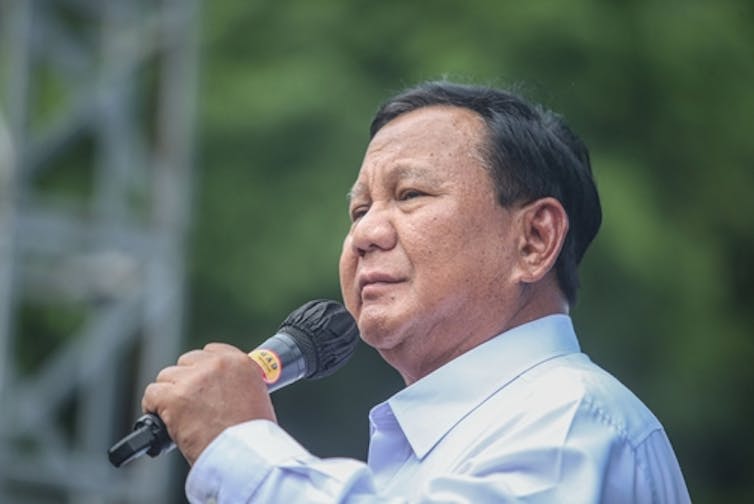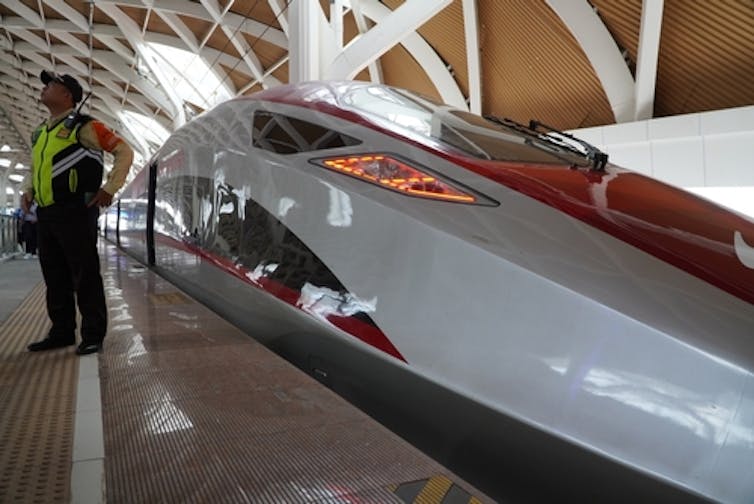The world’s third-largest democracy, Indonesia, eagerly awaits the outcome of the presidential election on Feb. 14.
Speculations are rife that former general Prabowo Subianto and his running mate, Gibran Rakabuming Raka, the son of the current President Joko “Jokowi” Widodo, will secure the largest number of votes, despite the possibility of a runoff later this year.
Indonesia’s presidential election may go to run-off, despite what the polls say
.
Prabowo is running against Anies Baswedan and Ganjar Pranowo for the presidency. With the controversy over Gibran’s nomination as Prabowo’s running mate, including accusations his father is abusing his power, the former general is expected to face fierce competition from both Anies (who is backed by Muslim conservatives) and Ganjar (who is supported by the country’s biggest political party, Indonesian Democratic Party of Struggle).
Regardless of the election outcome, as experts in China-Indonesia relations, we believe Indonesia’s stance towards China will likely remain steady, albeit with some minor variations depending on the victor.
Why China will remain a vital partner
Economically, China is a significant trading partner and source of investment for Indonesia, offering considerable development funds and economic opportunities.
In 2022, China’s investment in Indonesia, the largest economy in Southeast Asia, surged to US$5.18 billion – the highest level in the past decade. While the number of Chinese-sponsored projects in Indonesia dropped from 1,800 in 2021 to around 1,580 in 2022, the monetary value of these investments skyrocketed by almost 64%.
China’s major infrastructure project, the Belt and Road Initiative (BRI), also aligns with Indonesia’s development goals, offering opportunities for infrastructure development and economic cooperation. According to a recent report, Indonesia is one of the countries which receive the most BRI funding of any country, with its total debt to China now reaching $54.8 billion.
So, whoever wins the upcoming election will not drastically depart from Indonesia’s current foreign policy stance. Continuing the country’s friendly relations with China is both plausible and strategic.
Our latest report provides insight into the candidates’ potential approaches to China if elected, based on their engagements with Chinese officials in the past.
Prabowo has notably engaged extensively with China, meeting several times with Xiao Qian, the former Chinese ambassador to Indonesia, between 2018 and 2022.

He intends to continue this engagement and seek Chinese investment in the infrastructure and food security sectors.
His running mate, Gibran, has had limited interactions with China himself. However, he would be associated with his father’s close ties to China, which have taken precedence during his time in office.
Since Jokowi became prime minister, China has evolved into Indonesia’s largest trading partner and investor, with Chinese exports to Indonesia surging to $71.32 billion in 2022, up from less than $40 billion in 2014.
Ganjar, the governor of Central Java, has also as discussed investment cooperation, particularly in his region, during meetings with Chinese officials.
Meanwhile, his running mate, Mahfud MD, the coordinating minister for political, legal, and security affairs under Jokowi, has focused on sensitive geopolitical issues in his job, including legal and human rights. However, he has been critical of China’s policies.
While Chinese investments bring opportunities for development, they have also raised concerns among some communities about environmental degradation, cost overruns and labour issues
Accidents on Chinese projects are rampant, but why does Indonesia’s economy still depend on China?
.
The $8billion high-speed railway project in the capital Jakarta, for instance, has prompted fears over increased risks of landslides and impacts on water supplies.

Several Chinese nickel mining projects in Central Sulawesi have also encountered opposition due to reported environmental damage and adverse effects on local communities.
Concerns have also been raised about the Batang Toru hydropower project in Sumatra, which threatens the habitat of the critically endangered Tapanuli orangutan.
In contrast, Anies has primarily interacted with Western countries, with limited engagement with China. His vice presidential candidate, Muhaimin Iskandar, has had more interactions with Chinese officials recently, potentially compensating for Anies’ lack of experience.
It is expected that leaders like Anies or Ganjar may place greater emphasis on sustainable development and community engagement in Chinese-funded projects, aiming to balance economic growth with environmental protection and social welfare.
Modification of China-friendly policy
Given China’s rising global power status and presence in Southeast Asia, Indonesia recognises the strategic importance of engaging with China.
Mixue on the march: ice cream serves soft power for China in Southeast Asia
.
However, Indonesia must maintain a delicate balance between its relations with China and its alliances with other major powers, such as the United States and regional partners like Japan and Australia.
By engaging with China, Indonesia aims to navigate the complexities of regional geopolitics while safeguarding its sovereignty and national interests. Striking a balance between economic development and sustainable practices will also be important in shaping its future relations with China.
Whoever is elected must acknowledge Indonesia’s bargaining power with China.

Indonesia boasts the largest economy in Southeast Asia. It also has a significant position as a member of the G20 group of major economies, reflecting international confidence in its economic strength. In addition, Indonesia’s strategic location makes it a crucial part of China’s BRI ambitions.
By leveraging its strategic position and engaging in meaningful dialogue with China, Indonesia can pave the way for mutually beneficial cooperation that promotes sustainable development and prosperity for both nations.




